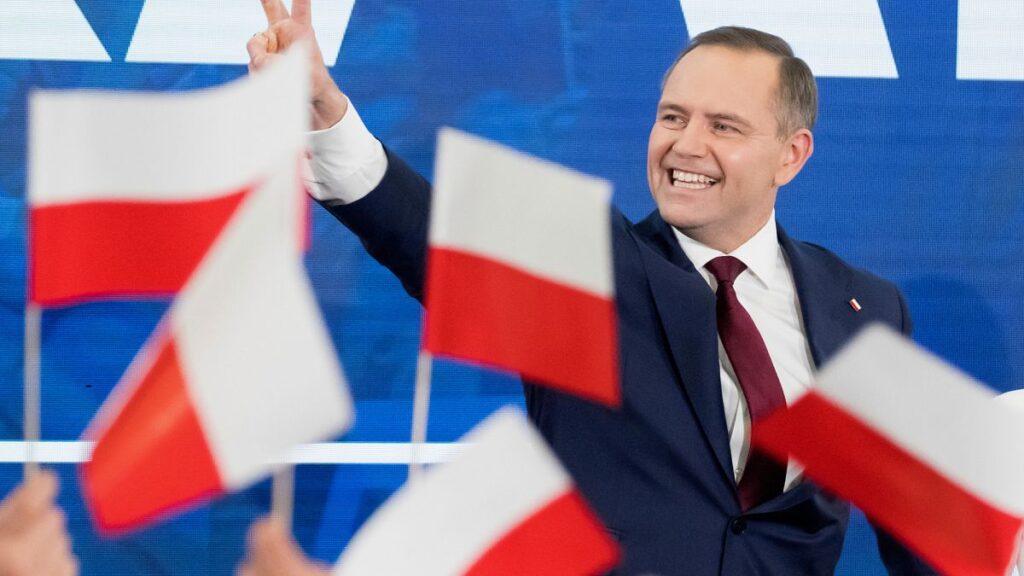While Poland’s president does not wield executive power to the extent of their counterpart in France, the election of Karol Nawrocki marks a significant political turning point, re-energising the right and focusing attention on the ideological gulf between the country’s pro-EU Prime Minister Donald Tusk and the Eurosceptic president.
His ascent to the presidency will reshape dynamics both within Poland and across the European stage.
The election result is a substantial setback for Tusk. Despite holding executive authority, Tusk’s position is now politically weakened.
Many analysts interpret Rafał Trzaskowski’s loss—his second after 2020—not as a vote for Nawrocki, but as a rejection of Tusk’s liberal government. Calls for Tusk’s resignation have already emerged, though such a move remains unlikely.
However, internal government shifts are expected, possibly including high-profile resignations such as that of the Minister of Justice.
Trzaskowski’s defeat leaves only Radek Sikorski, the current foreign minister, as a credible figure from the pro-European camp with growing influence.
Some insiders argue Sikorski, who lost the Civic Platform primary to Trzaskowski, would have had a better chance against Nawrocki.
With his growing stature and independent profile, Sikorski could now challenge Tusk’s leadership within the Civic Platform (PO), though his lack of a strong party base remains a constraint.
Nawrocki’s win also temporarily unites Poland’s historically fragmented right-wing camp. He received broad support from other conservative and far-right candidates, including Sławomir Mentzen of the Confederation party.
If this unity persists, it could lay the groundwork for a new conservative coalition ahead of the 2027 parliamentary elections.
European Union: Euroscepticism without ‘Polexit’
Nawrocki represents a Eurosceptic but not anti-EU stance. Unlike Trzaskowski, known for his alignment with Brussels, Nawrocki is critical of the EU’s direction—especially the Green Deal, migration pact, and proposals for treaty reform and greater centralisation.
Despite these critiques, Nawrocki does not advocate for Poland’s exit from the EU. His position aligns with many in the Polish political spectrum: maintain membership, but resist further integration.
As French centrist MEP Bernard Guetta warned, Nawrocki’s presidency may not result in immediate diplomatic ruptures, but “it will have damaging consequences for the long-term”.
Guetta warned that with backing from Donald Trump, Nawrocki could lead an effort to detach Poland from the EU’s political core and slow EU-wide integration projects such as joint weapons procurement under the new €150 billion SAFE initiative.
Russia and Ukraine: Hawkish on Russia, ambivalent on Kyiv
Nawrocki is staunchly anti-Russian. A former director of the Institute of National Remembrance, his academic and professional work has focused on Soviet-era crimes against Poles.
His support for the removal of Soviet monuments earned him a persona non grata status in Russia in 2022.
On Ukraine, however, Nawrocki’s stance is more cautious. While he supports Ukraine’s fight against Russian aggression, he is sceptical of Ukraine’s accession to the EU and NATO—primarily citing threats to Polish agriculture and unresolved historical grievances relating to World War II atrocities.
He conditions his support for Ukraine’s EU and NATO bids on symbolic and material concessions.
Transatlantic relations: Aligning with Trump’s GOP
Nawrocki is a committed trans Atlanticist, emphasising Poland’s military partnership with the US, to which he travelled during the campaign, meeting US President Donald Trump and his allies.
His campaign received vocal support from prominent American conservatives, including US Secretary of Homeland Security Kristi Noem.
For Nawrocki, a strong US military presence in Poland remains the primary pillar of national security, alongside modernisation of Poland’s own armed forces.
Conflict with Tusk government: Gridlock and institutional tensions
Poland has a history of cohabitation—when the president and government belong to opposing political camps.
Relations between Lech Kaczyński (president, PiS) and Donald Tusk (prime minister, PO) from 2007–2010, saw a period marked by persistent institutional clashes, including over foreign policy and defence.
After Bronisław Komorowski’s victory in the 2010 to 2015 presidential elections, relations between the government and the president were without major conflicts, as they were between 2015 and 2023, when President Andrzej Duda came from the same camp as the government of Beata Szydło and then Mateusz Morawiecki. Friction emerged after Tusk became prime minister again at the end of 2023.
One area of ongoing tension between the government and the presidency has been the nomination of ambassadors. Under Polish law, ambassadors are formally appointed by the president.
After the 2023 elections, Tusk’s government submitted a list proposing the dismissal of over 50 ambassadors. However, President Duda declined to approve several of these changes.
As a result, key diplomatic posts—such as Bogdan Klich in Washington and others in cities like Rome—remain without officially appointed ambassadors, with appointees acting only as heads of mission.
A similar institutional standoff is likely under President Nawrocki. He is expected to continue this assertive approach, potentially blocking or delaying nominations from Tusk’s administration, further complicating Poland’s foreign policy and weakening its diplomatic presence in critical international arenas.
Implications for the European right: A continental trend
Nawrocki’s victory energises European conservatives and the far right. He was congratulated by Trump, Hungarian PM Viktor Orbán and Italian Premier Giorgia Meloni.
He also campaigned with Romanian nationalist leader George Simion, and his win is being interpreted by right-wing circles as part of a broader continental shift—with similar trends seen in Austria, Belgium, the Netherlands and Portugal.
The consistent themes—rejection of the Green Deal, resistance to migration policy, and national sovereignty over EU integration—point to a common ideological framework.
The road to 2027
Nawrocki’s presidency introduces a new axis in Polish and European politics. While he lacks full executive power, his victory redefines Poland’s political narrative, shifts its diplomatic orientation, and could catalyse a realignment of the right both domestically and in Europe.
His win also throws the 2027 parliamentary elections into sharp focus.
With a weakened Tusk, a re-energised right, and growing transatlantic ties, Poland may become a central battlefield for the future of EU integration and transatlantic conservatism.
Read the full article here
